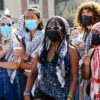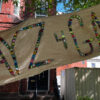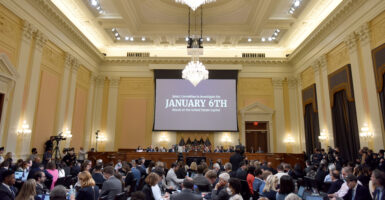The Supreme Court on Tuesday heard arguments in a challenge to the criminal prosecution of a Pennsylvania man, Joseph Fischer, for entering the Capitol on Jan. 6, 2021.
Lurking in the background is the fact that the outcome of this case could affect the pending federal indictment against former President Donald Trump in U.S. District Court for the District of Columbia.
Although the case that the court heard Tuesday is about what happened on Jan. 6, the court isn’t going to decide whether Jan. 6 was a peaceful protest or an insurrection. Instead, the court agreed to hear Fischer’s case to decide a different question; namely, whether Fischer can be prosecuted under a federal law that forbids corruptly obstructing an official proceeding.
Rules about how to interpret a statute—think textualism—will therefore play a far greater role in the court’s decision than the justices’ views on whether an insurrection occurred.
A grand jury indicted Fischer for violating several federal laws when he entered the Capitol on Jan. 6. One of those laws, 18 U.S.C. § 1512(c)(2), imposes criminal penalties on “whoever corruptly … or otherwise obstructs, influences, or impedes any official proceeding, or attempts to do so.”
Fischer filed a motion in the U.S. District Court to dismiss the charge, which the trial court granted. A divided three-judge panel of the U.S. Court of Appeals for the D.C. Circuit reversed, however, and reinstated the count. Fischer then asked the Supreme Court to take his case and decide what Section 1512(c) means.
Jeffrey Green with the Northwestern Supreme Court Practicum represented Fischer at Tuesday’s oral argument. Elizabeth Prelogar, the U.S. solicitor general, argued on behalf of the government.
Green urged the court to read Section 1512(c)(2) narrowly. Congress passed Section 1512(c), he explained, in the wake of the Enron financial scandal to prohibit tampering with evidence to be used in an official proceeding. Congress later added subsection (c)(2) to cover the gaps in the original statute and ban other forms of impairment.
By using “otherwise,” he argued, subsection (c)(2) was limited to similar kinds of obstructions as those that Section 1512(c)(1)—which covers tampering with documents or other objects with the intent to impair their integrity or availability for use in an official proceeding—sought to prohibit.
The solicitor general countered that subsection (c)(2) defined a different crime than subsection (c)(1), arguing that Section 1512 covers both tampering with evidence and obstructing an official proceeding. Under the government’s interpretation, Section 1512(c)(2) covers not only destroying documents that might be used in an investigation, but also attempting to impede Congress’ certification of election results.
The justices focused most of their questions on trying to understand the relationship between the two subsections.
Justice Sonia Sotomayor, for instance, pressed Green to answer why the statute was not like a movie theater sign that read, “[Y]ou will be kicked out of the theater if you photograph or record the actors or otherwise disrupt the performance.” Yelling, she observed, is not at all like recording the performance, but would clearly constitute the type of behavior that would get you expelled from the theater.
Justice Amy Coney Barrett asked Green whether the government could “take a shot” at proving Fischer did try to obstruct the delivery of Electoral College certificates if the court agreed with his reading of the statute. Green responded that the government could not, because “[a]ttempting to stop a vote count … is a very different act than actually changing a document or altering a document.”
Justice Samuel Alito observed that the statute could be read broadly, and that such a reading might be “more straightforward,” but that a narrower reading was possible.
Although the justices peppered Green with questions, they appeared more skeptical of the government’s broad reading of Section 1512(c)(2).
Chief Justice John Roberts pointed out that last week, the court announced in another decision that a general term in a statute is defined by more specific terms. Here, he added, “otherwise” is a general phrase and is preceded by a list of specific acts. Thus, applying that logic, subsection (c)(2) would seem to prohibit acts that achieved the same result as altering or destroying documents.
Justice Neil Gorsuch asked whether outbursts that required the court to reconvene or pulling a fire alarm that required a congressional vote to be rescheduled were federal felonies subject to 20 years in prison under the government’s interpretation of Section 1512(c). Prelogar responded that to the extent those hypotheticals focused on peaceful protests, it was not clear that the government would be able to prove that the protesters had the statutorily required “corrupt intent.”
When pressed by Gorsuch whether a peaceful protest that obstructed an official proceeding would be covered by the statute, the solicitor general again emphasized that finding the required intent would be a “high bar.” She conceded, however, that if the required intent and knowledge were present, then such conduct would violate Section 1512(c)(2) under her reading.
Alito, piggybacking on Gorsuch’s hypotheticals, asked whether protesters standing up and disrupting the court’s proceedings would violate Section 1512(c)(2). The solicitor general stated that “minimal” interferences would not be covered.
At the end of the day, enough justices appeared ready to read the Section 1512(c)(2) narrowly. But even if Fischer wins decisively, he and other Jan. 6 defendants will still face other charges, and their cases will be far from over.
Fischer’s case could affect special counsel Jack Smith’s prosecution of Trump, however. Smith has charged Trump with obstructing and impeding the electoral vote certification in violation of Section 1512(c)(2). A ruling that Section 1512(c)(2) is limited to obstructions of investigations, for instance, could make Smith’s efforts to convict the former president under that statute much harder, if not impossible.





























